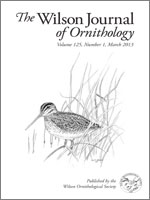We studied nestling provisioning and male song behavior associated with provisioning by Carolina Wrens (Thryothorus ludovicianus) throughout the nestling period. Overall, males and females (n = 14 pairs) provisioned at similar rates throughout four nestling stages although males tended to provision more at the earliest nest stage (1–3 days). Males and females increased their rate of provisioning progressively over the nestling period. Parents brought one food item at a time to the nest and load sizes were similar between males and females, and between early and late nest stages. Males sang 34% of the time on arrival at nests to provision and 49% on leaving nests after provisioning. There was no relationship between male song and age of the nestlings. Males sang more after provisioning nestlings when females were not present (55%) than when females were present (33%) at the nest. The function of male song during provisioning may be to communicate the male's location to the female and to indicate he has recently provisioned the nestlings but this requires further study.
How to translate text using browser tools
1 March 2013
Parental Provisioning by Carolina Wrens
Diane L. H. Neudorf,
Mallory J. Brodrick,
James C. Cureton
ACCESS THE FULL ARTICLE
breeding biology
load size
Parental care
song
Thryothorus ludovicianus





